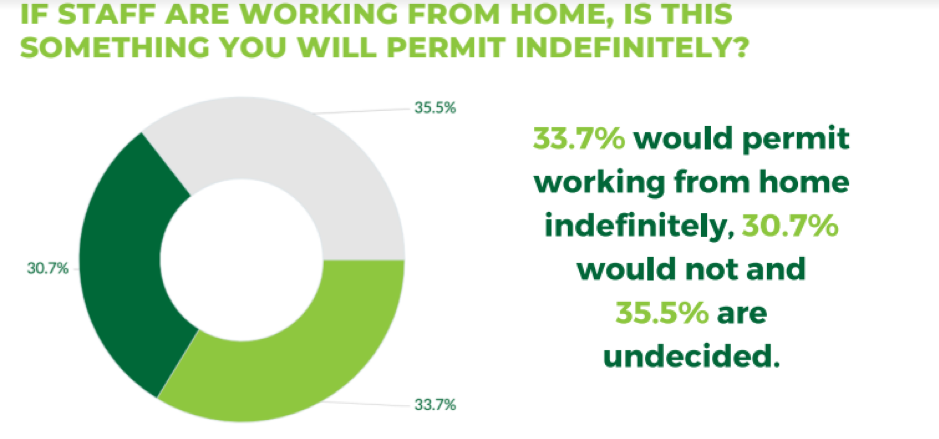Life After Lockdown: The Rise of Home Working
17 July

The COVID-19 pandemic has posed many severe challenges to the economy. In fact, back in June the BBC reported that according to the Office for National Statistics 600,000 people in the UK were made redundant, as the economy contracted significantly.
While most of the knock-on effects of the pandemic have been negative ones, unexpected progress has been made in regards to the shift in work-life balance.
In this blog, we’re going to be investigating how the pandemic has impacted working practices and changed our view on the balance between working and home life.
Working from Home Statistics
A recent study by Dale Office Interiors revealed that 71% of UK businesses are planning to introduce flexible working hours for the long-term. Our recent Life After Lockdown study also showed that 33.7% of businesses would be willing to allow working from home permanently.

Dale Office Interiors, who looked to the opinions of MDs, CEOs and small business owners, discovered that COVID-19 would have an impact on our longer-term view of how and when we do our work.
That said, physical offices are by no means a thing of the past, but the option to work remotely isn’t just a passing trend either.
Of course, offices will still be crucial for face-to-face meetings, inter-team collaboration, social interaction and for those who prefer to work in a more structured environment, but the study shows that 56% of businesses are actually planning to reduce overheads and downsize, as more take the option to work remotely.
Why Are We Adopting Remote Working?
Allowing staff to work remotely provides benefits to not only the worker but also the business too. The Dale Office Interior study found that 62% reported that the increase in flexibility had given them an added focus when it came to their work, and 55% said their productivity levels were boosted by allowing flexible hours.
The findings also suggest that remote working will remain in place even after social distancing rules have been relaxed, with only 24% claiming to want to return to the office full-time and 35% saying they’d prefer a more flexible arrangement where they could work from home at least some of the time.
Pros to Remote Working
Independence
Working from home isn’t just about the chance to work on your latest project in your PJ’s. Remote working gives you the opportunity to learn the skills of time management, self-motivation, discipline, focus and concentration. All of which are critical if you’re to have a successful career.
Productivity
You can simply get more work done at home, providing you’re not sitting in front of the telly. For starters, you aren’t commuting, which on average gives you 58.4 minutes to spend more productively. Plus, you don’t have the side-effects of office work, such as loud co-workers, interruptions, and chatter.
Communication
When a face-to-face meeting isn’t possible, you need to be continually communicating with your team and higher-ups. Texting, Slacking, Skyping, emailing and video chats all become necessities when you’re working remotely.
Cons to Remote Working

Switching Off
When there is no longer a separation between heading to and from your office, there are no barriers between the workday and your life at home.
Feeling as though you’re still at work, even when you’re relaxing in front of the telly during the evening is common, and can often lead to burnout.
Feeling Out of the Loop
You may not realise it until you’re away from the office, but a lot of casual collaboration happens within the confines of the office. Whether it’s an impromptu brainstorm over lunch or general office chit-chat, it’s hard to replicate that dynamic when one party is at home.
Data Security
For the most part, cloud technology has made working remotely more accessible than ever. However, there needs to be a transparent process around data security and client data protection to ensure that everyone is fully protected.
Takeaways
Never underestimate the value of face time and ensure that you’re far more communicative than usual, even if it is just to boost team bonding.
Remember, there are far fewer opportunities for team building when you’re working away from the office, so it’s imperative to find ways of proactively engaging with your co-workers.
Keep your workspace professional; even if you don’t have space for an actual office. You should set up a working area that remains off-limits to the rest of the household while you undertake your work.
Remember to be responsive and try to make yourself available for conference calls when possible, even if you aren’t sticking to the traditional working hours. With this in mind, it’s a good idea to set aside some time each day or even weekly, for regular updates with your manager and colleagues. This not only helps everyone stay accountable for their workload but also reminds everyone how important the idea of teamwork is.










